Intel Core i9-13900K and i5-13600K Review: Raptor Lake Brings More Bite
by Gavin Bonshor on October 20, 2022 9:00 AM ESTGaming Performance: 1440p
In our Ryzen 7000 series review, we saw users commenting about testing games for CPU reviews at 1440p, so we have duly obliged here. Those interested in 1440p performance with minimal image quality – particularly the esports crowd – will be glad to know that we will be testing at this resolution going forward into 2023 and beyond.
Civilization VI
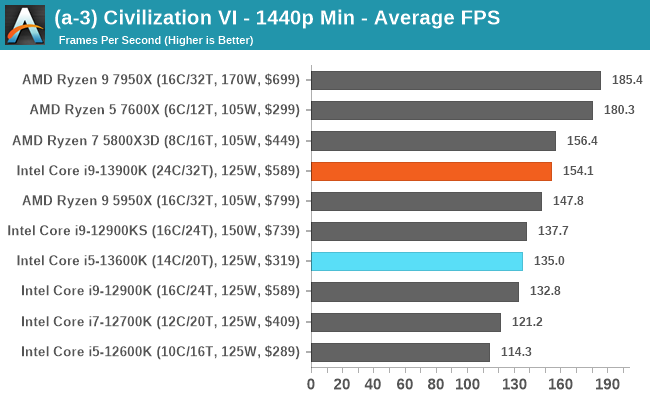
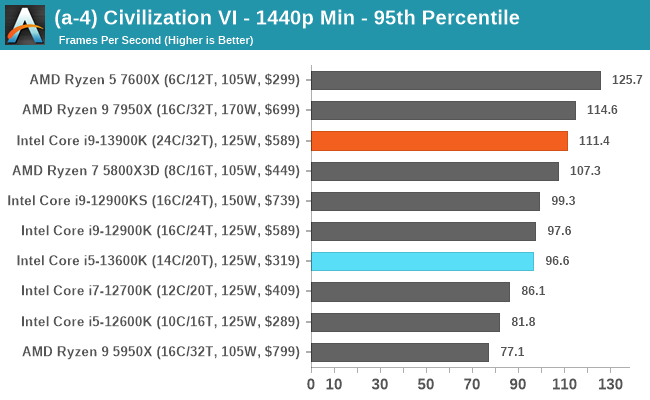
Borderlands 3
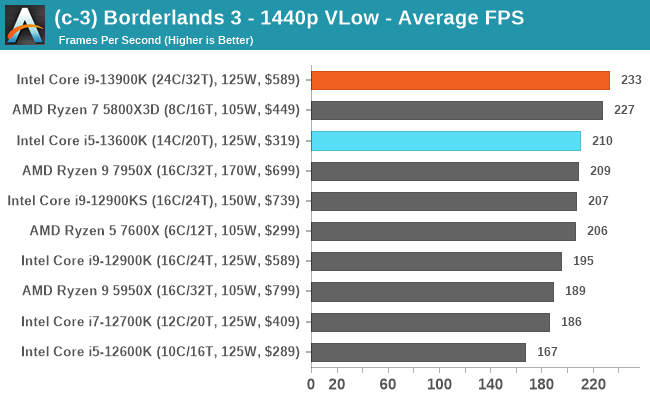
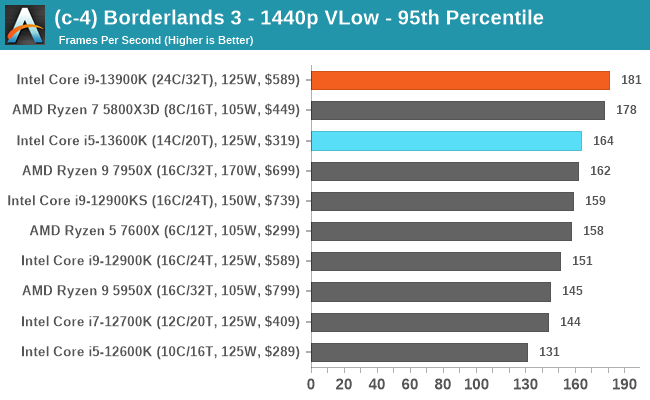
Grand Theft Auto V
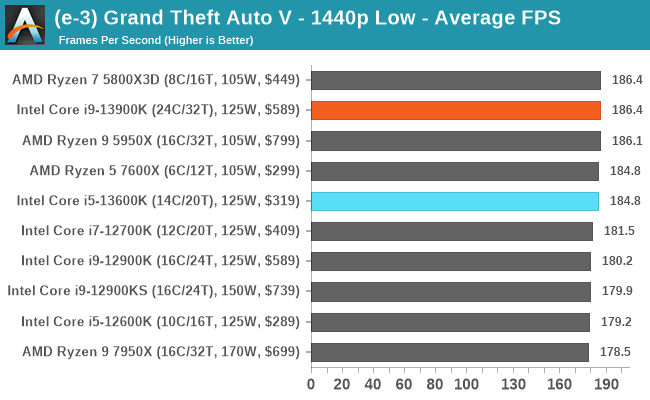
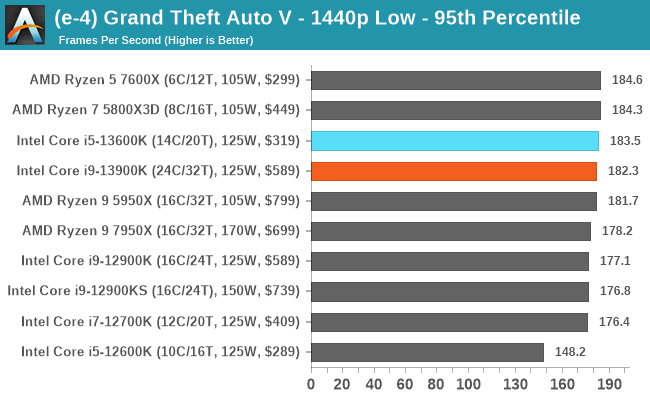
Red Dead Redemption 2
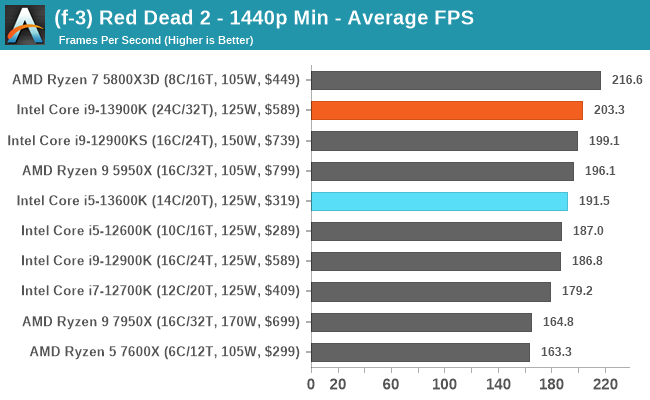
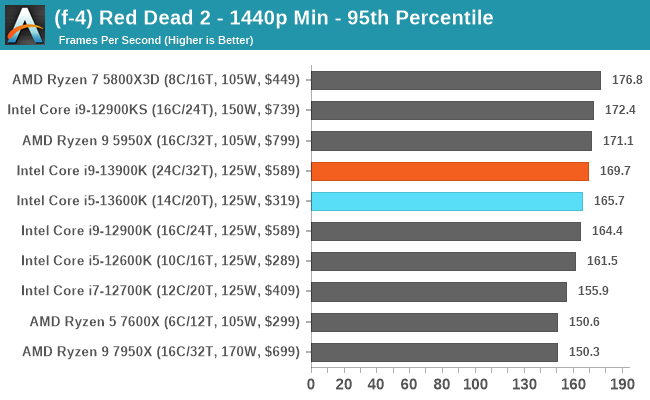
F1 2022
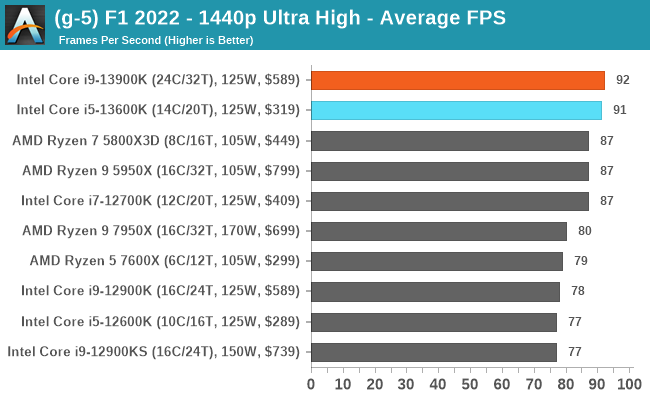
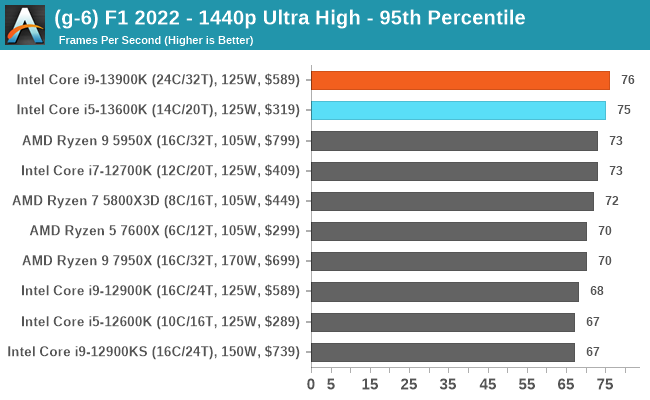
Hitman 3
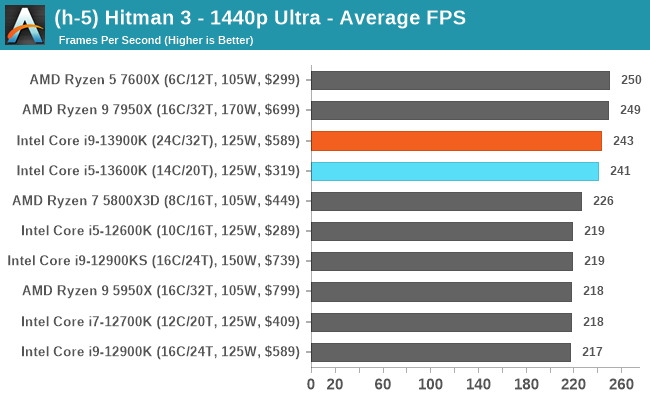
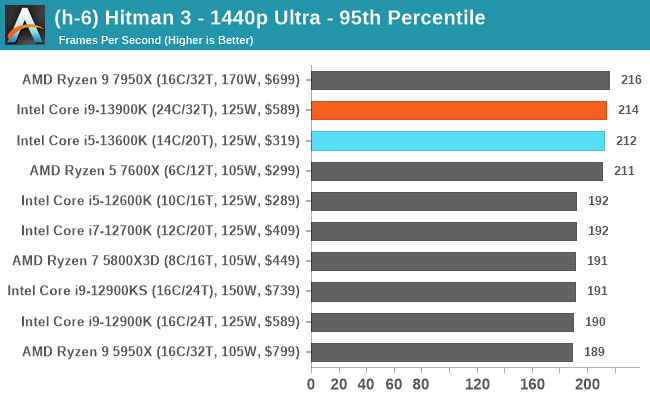
Total War: Warhammer 3
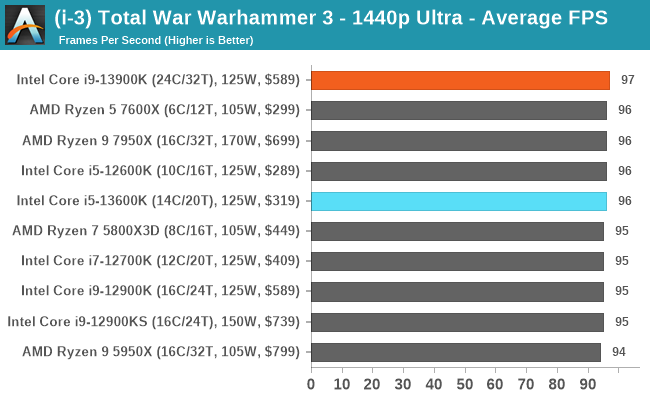
We noticed some discrepancies in our Cyberpunk 2077 testing at 1440p and 4K; we will publish these results once we identify the issue.
The first thing to note in our 1440p testing is that in Civ VI, and throughout, we've seen dominance from AMD's Zen 4 core here. I've retested numerous times to confirm, and they are correct. It's also worth noting that again, the Ryzen 7 5800X3D performs well in some of the titles, especially Red Dead Redemption 2, Grand Theft Auto V, and in Borderlands 3. If a title can utilize all of that 3D V-Cache, then the 5800X3D excels, even against the latest and great Zen 4 and Raptor Lake chips.
Throughout our 1440p testing, the latest Intel 13th Generation core has performed well, and although it gets pipped by the Core i9-12900KS in some of the tests, most of the processors are competitive in titles such as F1 2022, and Grand Theft Auto V.










169 Comments
View All Comments
Bruzzone - Friday, October 21, 2022 - link
Raptor ask first day in the open market;13900K = $845 + 43% over i$1K
13900KF = $1187 + 110%
13700K = $393 (-12.5%) some assemblance of reality in the world
13700KF = $415 + 8%
13600K = $393 + 23%
13600KF = $415 + 34%
Raphael R7K fifth week of supply open market;
7950X = $933 + 33.6%
7900X = $695 + 26.6%
7700K = $477 + 19.5%
7600X = $422 + 41.3%
In July Intel signaled a +20% price increase and AMD ignored Intel counsel and the channel will settle that question by Black Friday Cybor Monday. The question has already been answered for dGPU in the market for RTX 4090?
mb Reply
Wrs - Friday, October 21, 2022 - link
That's why I usually buy new hardware a bit after Xmas. That wouldn't have worked for several reasons in 2020-21, but other years it's served me well. ReplyBruzzone - Friday, October 21, 2022 - link
Prior gen CPU and dGPU production overage run end absolutely a "bit after Christmas".New primary dGPU a Pareto distribution curve and that does not explain it the situation assessment fully for all consideration.
On new CPU production AMD ignoring Intel + 20% price increase offer it's a CPU new primary price war unless the channel disagrees bringing normalcy to cost : price / margin assessment on cost : price / margin realities.
mb Reply
Ryan Smith - Thursday, October 20, 2022 - link
Like any other CPU launch, the only prices we have at the start are the prices provided by the manufacturers. Retail prices can and will vary, especially at the very start when chips are in short supply.It's best to consider it guidance rather than hard numbers. Reply
allenb - Thursday, October 20, 2022 - link
Now this is what we want to see! Proper, vicious, dog-eat-dog competition from Intel and AMD. I've rarely seen a clearer example of why competition is good and entrenched monopolies (or near monopolies) are bad. Hats off to both competitors. ReplyOxford Guy - Friday, October 28, 2022 - link
Duopoly is hardly adequate competition. ReplySilver5urfer - Thursday, October 20, 2022 - link
I will keep it short.Buy Intel get it under AIO and get ready for 340W load on 13900K while AMD Zen 4 is at 95C but its significantly lower power at 230W only max. The flagship parts need AIOs no Air coolers, but with AMD some of the Air coolers can work without problem since the heat is only factor but not the high power as the Temp target can be set on AMD platform from 95C to 92C. Intel 12900K and up aka 13700K, 13900K cannot be tamed on Air coolers esp when you tune them. So a mild win to AMD.
The I/O is a win for Intel due to DMI is 4.0x8 while X670E is PCIe4.0x4 like X570 bummer from AMD perhaps PCIe5.0 redrivers and layers cost.
IMC wise Intel is winning, but with DDR5 in this infancy stage even buying 7000MHz low Latency DRAM won't benefit RPL at all. AMD stuck to 6000MHz EXPO why did you not review on that ? I think AT should have stuck to XMP for Intel and EXPO for AMD as AMD will have better performance with better DRAM since the Zen 2 days. Ultimately IMC is bragging right for Intel DDR5 RPL now, the socket is EOL and you cannot install new Kits and expect magic just like 8th gen vs 10th gen IMCs you will need a new Chip.
Socket is dead end for Intel nothing extra is coming, you are locked out. AM5 will get Zen 4D and Zen 5 and 5D as well. Much better longevity past 2025+ if AMD launches Zen 6 then it's insane on this AM5 socket. Also Z790 will have CPU socket bending issues note that as well.AMD wins here.
Performance wise, both are neck to neck. High clocks on both high MT workloads on both camps, this is very interesting market for R9 and i9 parts. Coming to i5 and R5 parts, Intel has more performance but AMD has better pricing. However the most parts shipped will be this range only I think Intel may win more Client sales vs AMD due to DDR4. No winner but it's a great consumer choice. One point to note, AMD has higher Base Freq vs Intel this means better performance for AMD on all workloads and not just demanding. Esp with Zen 4 which is a solid chip than Zen 3 with it's lower clocks annoying IOD crapping out and IMC being subpar.
AVX512 is dead, big shame to Intel. They are wasting 30% of the die space in the RPL processors P cores, ultimate pathetic move. AMD is a champion with dual AVX256 making it solid no AVX offset performance unlike Intel 11th and 12th gen. AMD wins here. Reply
WaltC - Thursday, October 20, 2022 - link
I hope this sad excuse from Intel shuts the facial orifices of those who thought the power draw of the 7950X was "too high"...;) These CPUs should sell well in colder climes, no doubt (for people who can afford the power bills...;)) ReplyWrs - Friday, October 21, 2022 - link
For workload efficiency it's mainly about the process tech. AMD with TSMC are at 5nm, Intel is still at 7nm (or you can say TSMC is around Intel's 7nm, while Intel is using its 3rd-gen 10nm).I like my P-cores on 12900k, thank you, they are the reason I didn't stick with Zen 3. A desktop computer needs to be highly responsive and it needs throughput when called for. I weigh those as 50% ST:50% MT, but everyone should personalize their ratio to what they really do. 90% ST:10% MT? Get a laptop. 10% ST:90% MT? A workstation or remote server/cloud.
I also have no issue with a D15 air cooler. The processor automatically tamps down to 250W sustained, but if I want something intense done, it'll blitz through the first second or two. As for power bill considerations, the Zen 3 did idle pretty high and I noticed. But on my desktop I rarely ever idle. It was more that a year ago, Zen 3 and Alder Lake were the same process generation, and Alder Lake hands down won the ST. Reply
yh125d - Thursday, October 20, 2022 - link
So top of the line Raptor Lake trades blows/equals on average to Zen 4. But only if you have a motherboard/cooler capable of delivering and cooling 300+w, which means top of the line hardware. By the time you factor in the cost of a top notch MB and 360 AIO, you erase the price advantage of the processor itself.Limit i9 to similar power levels, and the performance would reduce more than just a few % I'd wager, so for those sticking with air cooling or smaller AIO's, Zen 4 has a clear advantage. This also points out that Raptor Lake doesn't have much headroom above this to go, where Zen 4 (if allowed 250w+) would clearly outperform RL at same power levels
Overall, this generation is much closer than I'd thought it would be, which as always is great for consumers Reply